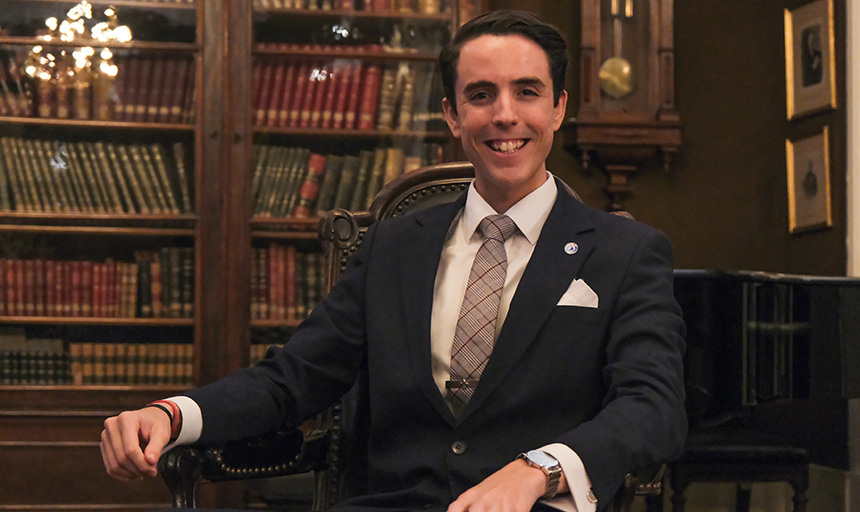
In a few short years, Gaston Ocampo ’20 has gone from Buenos Aires to Roanoke to Lisbon, a journey spanning more than 8,500 miles — and he’s not done yet. He’s out to change the world.
“My role and that of our organization is to build bridges,” said Ocampo, an international relations and business administration graduate. “In the regions we serve, multifaceted challenges persist, creating ripples that transcend borders and influence our collective future.”
Ocampo, who grew up in Argentina, was writing from his new offices in Portugal, where last fall he was appointed secretary general of the Institute for the Promotion of Latin America and the Caribbean (IPDAL), an international nonprofit dedicated to strengthening economic and cultural ties between Portugal, Latin America and the Caribbean.
The work puts Ocampo at the center of a whirlwind portfolio of global concerns. For the Maroon who co-founded the International Club, led the Public Affairs Society and did undergrad research in Turkey and Tunisia, it’s nothing short of a dream gig.
“It’s all about fostering understanding and cooperation,” he said. “Serving with IPDAL is an honor that allows me to contribute to tackling some of the challenges that affect the region I love and come from.”
Q: What are some of the pressing issues facing the communities you serve, and how does IPDAL work to address them?
IPDAL builds bridges between a wide array of actors from private, public and academic spheres. The communities we work with have an incredible spirit and cultural richness. They’re also confronting complex challenges: socio-economic disparities, environmental degradation, political instability and the ongoing struggle for accessible education and health care are among them.
IPDAL provides a platform for leaders to discuss the challenges and opportunities in their respective regions, with a positive and future-oriented mentality. Our mission is to strengthen relations and dialogue across hemispheres through innovative collaboration. That can include economic diplomacy, research projects, high-level conferences and cultural activities. Throughout, we keep the development of Latin America and the Caribbean at the core of our projects.
"Serving with IPDAL is an honor that allows me to contribute to tackling some of the challenges that affect the region I love and come from."
Gaston Ocampo '20
Q: How can Roanoke alumni contribute to creating change?
Communities in Roanoke and beyond play an instrumental role in supporting these regions. Staying informed, advocating for inclusive policies, supporting cultural exchanges and championing humanitarian initiatives all contribute significantly.
Amidst its challenges, Latin America and the Caribbean exhibit an inspiring resilience and hope that are drivers of progress. Maroons on campus and all over the world showcase that same spirit to do good and have impact. I encourage everyone to continue acting locally while thinking globally and staying aware of the challenges and needs of societies around the world.
Q: How did you discover your passion for international development work, and how did it lead you to IPDAL?
My journey to IPDAL is intricately woven with my experiences and teachings at Roanoke. I arrived as a freshman all the way from Buenos Aires and found a community where I could get guidance from esteemed professors, unwavering support from staff and camaraderie from my fellow students. That was the foundation for a profound understanding and appreciation of the importance of global interconnectedness.
I am forever grateful to everyone who supported and encouraged me. They are the architects of my dream to work in this field. During my years at Roanoke, I was able to study abroad and did a Washington Semester internship with the Inter-American Dialogue, a foreign policy think tank where I worked after graduation before joining IPDAL.
I also learned the values of purpose and impact. That is the Roanoke difference — empowering us to discover our purpose and enact goodness wherever our journey takes us. I still remember the words of a professor: “Go from small and safe worlds into larger and more challenging ones.”